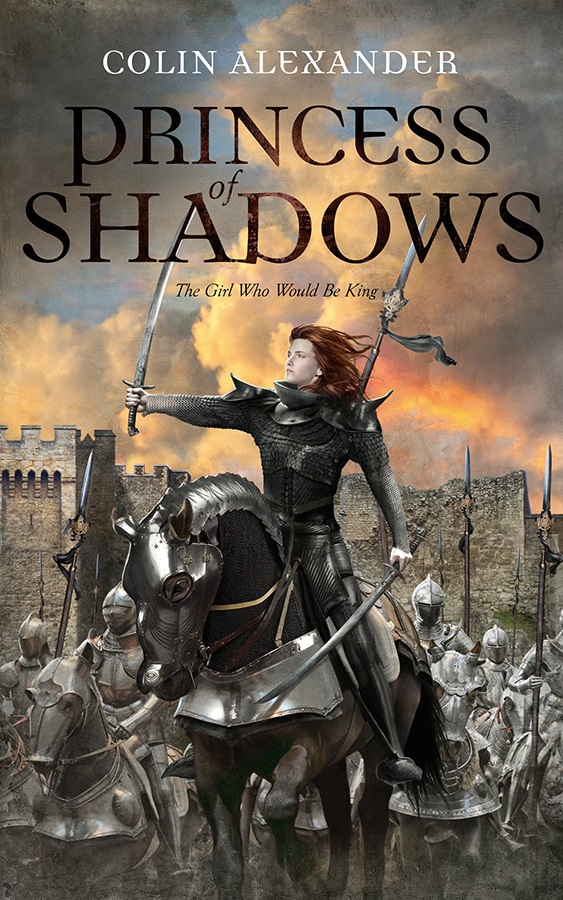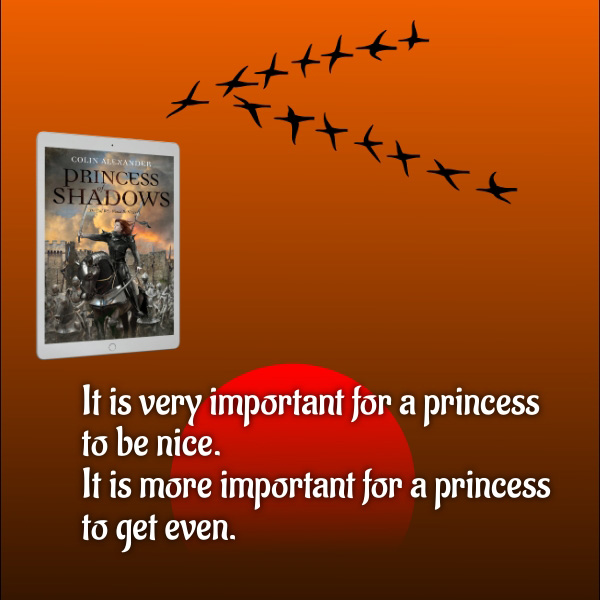Dive into Colin Alexander’s sci-fantasy masterpiece: Princess of Shadows: The Girl Who Would Be King.
A princess doesn’t lead an army. Or does she?
It is a hard life on a strange world under a red sun that never moves in the heavens, its landscape dotted with the ruins of the Ancients who came from beyond the sky. The Kingdom of the Light, Shadows, and Dark brought stability to this world for generations, but peace is dying as the kingdom crumbles. Rebellion and warfare are rife in the realm, and death in all its brutal forms stalks the land.
Aeryn, the Princess of Shadows, is second in line to the throne. As a young child, she loves stories of the Ancients and wants to see what is beyond the sky. The fighting, however, brings an abrupt end to her childhood and shatters not only the Light, Shadows, and Dark, but her family as well. She grows up amid war and loss, a smart, stubborn, and quick-tempered girl who promises her mother she would always do her best and vows to be true to her word. Childhood dreams must wait; her priorities become revenge and the throne of a restored kingdom.
Achieving any of her goals seems unlikely as obstacles are piled, one after another, in front of her. Armies fail, castles fall, and erstwhile allies betray. She makes plenty of mistakes and must learn from her errors fast enough to survive. She finds friends and allies in strange places, but there are many who see her as nothing more than a pawn in their own plays for power. The odds are not in her favor. If she fails, humanity will face a bleak future on an unforgiving world.
What is the future of a young princess beset by powerful lords and captains? What is the fate of those men when the princess decides to get even?
Warnings: Combat scenes both one-on-one and armies, named characters die.
Includes bi, lesbian and gay characters.
Amazon | Universal Buy Link
Author Interview
How did you choose the topic for this book?
Confession: I did not choose the topic, the story chose the topic itself. How does this make sense? The story originated from an image and a sentence that went with it, both of which popped into my head one afternoon while I was trying to work on something else. The image was of a girl drawing a sword. Just that much. The sentence was: “They followed their king and her banners.” There had to be a story connected to this mental picture, but it wasn’t immediately apparent what it was. To find it, the first questions I had to answer were: who is the girl, why is she drawing a sword, and how does that sentence make sense? Well, the girl is our princess, and she is drawing a sword because a battle is coming. The sentence led directly to the subtitle of the book. Those answers led to more questions – why will the battle occur? – and each succeeding answer led to another question. Eventually, because this image winds up being very late in the story, I worked my way back to the beginning. It was only then that I started to design the world in which all of this takes place. I wanted a strange world for the story, but one that could be real, somewhere out in the universe. Consequently, the world is built in a science fictional way, and that led to the backstory of the Ancients who came from beyond the sky. (Yes, Gimlé, the name of the world, comes from Norse mythology; it is the hall where survivors gather after Ragnorak.) Consequently, I would have to say that the story developed itself backwards.
Tell us about your heroes. What makes them tick?
I like to think of my heroes as real people. They act based on their make-up and for understandable personal reasons. My favorite, of course, is Aeryn, the princess. She is a very bright kid who exhausts everyone with the questions she keeps asking. As a child, she makes a promise to her mother and carries her determination to keep that promise throughout the story. Her personality has its problems too. This is a stubborn kid, and as determined as she is to keep her word, she is equally set on getting even. She makes mistakes both from inexperience (we follow her from age six to eighteen) and because of a wicked temper. She does learn from those mistakes, even if, sometimes, she needs someone to rub her nose in it first.
In similar fashion, decision-making grows out of personal characteristics for secondary characters, and we can take a quick look at a few of them. Arthur, Aeryn’s father, has the impetuous streak we see in her. This has a major impact on the decision-making (and the story) as does his strong desire not to be the “king who fails.” Fitzwilliams’s narcissism governs his thinking and many of his choices. Robert Darnald, King Arthur’s principal adviser, is a careful and cautious man. He lives by the saying “measure-twice, cut once,” but he knows how to be decisive, especially in a fight. Sophia, the queen and Aeryn’s mother, has a relatively small part but she is courageous and deliberative, characteristics consistent with her making, under pressure, what might be the most important decision of all.
What are you working on now and when can we expect it?
Most immediately, I am deep into a hard science fiction book. This will be the fifth story in the Leif the Lucky series and I expect it to come out in mid-2024. The events in that story will come immediately after the conclusion of A Planet of Wrath and Tears, which was released in December 2023. After that, I am most likely to come back to Gimlé for a different adventure.
Excerpt
“Gods and Goddesses!” Sophia said as she looked at her daughter. “What has my little Red Rynnie been doing?”
The miniature tornado turned to Robert. “Mama says I should be called Her Royal Lowness because I’m little, but look at my feet!” She stuck out a bare foot covered in dirt from heel to toe. “If puppies have big paws, they grow into big dogs. I’m going to be a big girl!” She turned back to her mother. “And, Mama, Rynnie is a baby name. I’m too big for that already. I’m Aeryn the Red!” She held out a curl of hair the same color as Sophia’s. Aeryn the Red was a sturdy child of about six standards. Dirt caked both freckled cheeks under green eyes and smeared her pink dress.
“All right.” Sophia laughed. “What has Aeryn the Red been doing, and how is it possible that you got so dirty?”
“We were playing vendetta outside, Mama,” said Aeryn.
“You were playing outside with the boys? In your dress?”
“I love my dress.” Aeryn smoothed down the side of the dress and transferred more dirt from her hands to the fabric as she did. “It’s just like your pink one.”
Sophia sighed. “And what do you mean about ‘playing vendetta’?”
“It’s a game, Mama. Somebody is ‘it’ and that means they have to go, ‘I cry vendetta,’ and then they’re the vendetta rider and they have to tag everyone else and then somebody else is it.”
“Vendetta,” Sophia said. “Saints. In the bad old days before the Hammer, a man could ‘cry vendetta’ against people he said wronged him. That was an oath that he would hunt down and kill all of them or he would die trying.” She shuddered. “Families were destroyed, villages burned. Yes, men still have rencontres and they still fight their duels, but no one cries vendetta anymore. The Hammer put a stop to that.”
“It’s a game, Mama!”
“Oh, and are you dirty because you fell when you were tagged? Or did you fall trying to tag someone?”
“No,” Aeryn said. “Siggy pushed me into the fosse.”
Sophia shook her head and considered that. Siggy was Sigismund Fitzwilliam, eldest son of Dux Matthew Fitzwilliam, on whom Arthur often relied, and who made a point of being at Triad frequently. With his eldest. Of course, even if Siggy had been nothing more than the son of an eques, she could not have complained about him pushing her princess into a big ditch. Arthur the Hammer had famously said of his children, “If they can’t survive growing up like everyone else, they don’t deserve to rule anyone else.” He had written that into his Code as well. Children did not receive any courtesies of rank before they reached adulthood at fourteen. Aemond, Aeryn’s elder brother, was Siggy’s age and should have stood up for his sister—but, no, Aemond was with his tutor. Sophia settled for saying, “Siggy is bigger and older. He should know better than to treat a smaller girl like that.”
“It’s all right, Mama,” Aeryn said. “I didn’t cry. You know that.”
That was the truth too. Aeryn had announced when she was about three that only babies cried, and that she was no longer a baby. From that time forward, no matter the scrape, bruise, or fall—and there had been many—no one had seen her cry.
“Very well, my young Princess of Shadows,” Robert said, “what did you do after Siggy pushed you into the fosse?”
“Well, I climbed out, of course.” Aeryn paused to be sure her mother and Robert were looking at her. “He is bigger, Mama. So I waited until he was doing something else and then I ran into him from behind as hard as I could, and I knocked him into the fosse. Headfirst! His nose is bloody now.”
“You hit him from behind? That’s not very nice, Aeryn,” Sophia said.
“I wasn’t feeling nice. I was mad.”
“You need to watch your temper, my little scapegrace,” Sophia said. “Princesses must always be nice.”
Aeryn stomped her bare foot on the floor. Then she put both fists on her hips and turned to look up at Darnald. “What would Comes Robert Darnald, who advises the king, say?”
Robert found himself chuckling, despite the work he knew was waiting for him. Of all the children who swarmed through the castle and its grounds, he found Aeryn special—and not because she was Princess of Shadows, currently second in line to the throne after Aemond. “You are a princess,” he said. “You must remember that a princess should be nice whenever she can. However . . . it is much more important for a princess to always get even.”
Aeryn giggled and made something between a bow and a curtsy. “I want to go take care of Barnabas, my pony,” she said, and spun to go.
“You change out of that dress first!” Sophia shouted after her. “And you put boots on your feet before you go mucking in that stall!”
When Aeryn had vanished and the beat of her footsteps had faded, Sophia looked at Darnald and grinned. “You put dangerous ideas into that child’s mind.”
“No, Ma’am,” Robert said. “They grow there quite spontaneously.”
Author Bio
Colin Alexander is a writer of science fiction and fantasy. Actually, Colin Alexander is the pseudonym for Alton Kremer, maybe his alter ego, or who he would have been if he hadn’t been a physician and biochemist and had a career as a medical researcher. His most recent book, A Planet of Wrath and Tears, is his tenth and the fourth of the Leif the Lucky novels. Colin is an active member of the Science Fiction and Fantasy Writers Association, Mystery Writers of America, and the Maine Writers & Publishers Alliance. Away from writing fiction, his idea of relaxation is martial arts (taekwondo and minna jiu jitsu). He lives in Maine with his wife.
Liminal Fiction: https://www.limfic.com/mbm-book-author/colin-alexander/
Author Facebook (Author Page): https://www.facebook.com/ColinAlexanderAuthor
Author Goodreads: https://www.goodreads.com/colinalexander






